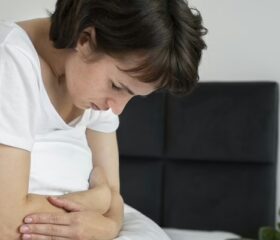What Is Postpartum Depression? Symptoms, Causes, and Treatment
Coming home with a new baby is exciting. However, some women also get weighed down in the postpartum period by a range of complex emotions, including persistent sadness, which is known as postpartum depression.

- What is postpartum depression?
- What are the symptoms of postpartum depression?
- How does PPD compare to other postpartum mental health conditions?
- What causes postpartum depression?
- Who is at risk of developing postpartum depression?
- Postpartum depression in fathers and other partners
- How to seek help and find treatment for postpartum depression
- Final thoughts
If you’ve consistently been feeling down after having your baby, it may be postpartum depression. It’s more persistent than baby blues—which are also often milder—and may require treatment. 1
Here’s what you need to know about postpartum depression, including its causes, the risk factors for it, and a few techniques you can use to manage it.
What is postpartum depression?
Postpartum depression (PPD) is a moderate to severe type of depression that affects 6.5%–20% of moms after childbirth. 2 3
PPD is more than just feeling down or experiencing temporary mood swings. It involves lingering and intense feelings of sadness, anxiety, and exhaustion that may interfere with your daily life and your ability to care for yourself and your baby.
PPD is not a sign of weakness or a character flaw. It’s influenced by hormonal shifts, genetics, environmental factors, and, of course, your own experience in the postpartum period and how much you have on your plate.
When does postpartum depression start?
As the name suggests, postpartum depression occurs after childbirth, although you may also experience some depression during pregnancy (sometimes referred to as prenatal depression).
The symptoms of PPD normally appear 4–8 weeks after childbirth, but may also occur up to a year after you have your baby. 1 2
PPD can go on for years if you don’t get treatment from your doctor. 2
What are the symptoms of postpartum depression?
Postpartum depression symptoms vary from person to person and aren’t always easy to spot, especially with all your attention centering on your new baby.
The most obvious sign is a feeling of pervasive sadness, hopelessness, or emptiness lasting more than two weeks. 1 You may also experience negative thoughts about yourself, such as feeling like a bad parent or like you’re worthless or inadequate.
Call your doctor immediately if you have thoughts of harming yourself or your baby. It probably goes without saying, but this is a serious symptom that requires immediate attention.
Other signs of PPD
Depression can also come with other emotional and behavioral signifiers: 4 1
- Loss of interest or pleasure: If you lose interest in hobbies or subjects you previously enjoyed, it could be a sign of depression.
- Changes in appetite or sleep: You may have PPD if you have noticeable changes in your appetite (not wanting to eat or overeating) or in your sleeping habits, such as difficulty sleeping (insomnia) or excessive sleeping.
- Fatigue and loss of energy: You may feel constantly tired, even when you do get adequate rest.
- Anxiety and irritability: Some women find they’re easily agitated, restless, or irritable, and may even have heart palpitations. 5
- Difficulty concentrating: You may have trouble focusing, making decisions, or remembering things.
- Social withdrawal: Isolating yourself from your family, friends, and normal social activities is a sign of PPD.
- Difficulty bonding with your baby: You may feel disconnected from your baby or have difficulty establishing a strong emotional bond. You may even have a fear of touching him. 6
- Unexplained physical symptoms: Certain physical ailments during postpartum, like headaches, cramps, or digestive issues may appear without any clear reason. If they don’t get better, even with treatment, it may be a sign of PPD (and even if they do have another cause, PPD could exacerbate your symptoms).
These symptoms may overlap with other mental health conditions, such as postpartum anxiety (PPA) and postpartum rage. It’s important to talk to your doctor as soon as you feel unwell or overwhelmed.
How does PPD compare to other postpartum mental health conditions?
Like we just alluded to, PPD isn’t the only mental health condition recent mothers sometimes develop, and people sometimes conflate it with conditions like postpartum anxiety and the “baby blues.”
These conditions aren’t quite the same. PPD is usually considered to be more severe and longer-lasting than baby blues (which is a colloquial term, although it’s commonly linked to Postpartum Mood Disturbance, an actual medical diagnosis). 2
As for postpartum anxiety, it can occur at the same time as PPD, but it’s characterized by excessive worry and compulsive behaviors. These may include staying up the whole night because you think your baby will stop breathing, being terrified to leave your baby alone for a few minutes (even with a trusted loved one), or being afraid to leave the house because you think someone will hurt you or your baby. 5
Postpartum depression vs. anxiety vs. baby blues
Here’s a more detailed comparison of PPD, PPA, and baby blues: 7 2 8 1
| Condition | Postpartum depression | Postpartum anxiety | Baby blues |
|---|---|---|---|
| Symptoms | Changes in: - Sleep - Appetite - Energy Feelings of: Thoughts of self-harm or hurting your baby. |
- Trouble sleeping or staying still - Nausea / stomach aches - Muscle tension - Panic attacks (intense anxiety plus a rapid heartbeat, feelings of doom, shortness of breath, and dizziness) May leads to symptoms of obsessive-compulsive disorder (OCD), such as intrusive thoughts and compulsive behavior |
- Mood swings - Irritability - Crying spells - Anxiety - Difficulty sleeping |
| Onset | May start in the first weeks after giving birth | Variable, may start: - During pregnancy - Right after birth or adoption - When your baby is several months old |
Usually within the first few days of giving birth |
| Timeline | Can last for months or years without treatment | Usually persists if left untreated. | Generally gets worse between days 3 and 5 Normally doesn't last longer than 2 weeks |
Postpartum psychosis vs. postpartum depression
Some women develop a severe mental illness called postpartum psychosis, which is an emergency and requires immediate intervention by a doctor. 9
About 5% of cases of postpartum psychosis end in suicide or infanticide. It’s very important to get help if you experience any symptoms, which include: 10 1
- Hallucinations or delusions
- Confusion and disorientation
- Rapid mood swings
- Obsessive, intrusive thoughts about your baby (such as persistent and irrational anxieties)
- Paranoia
- Thoughts of harming oneself or your baby
Again, if you (or someone you know) is experiencing these symptoms, seek emergency medical help immediately.
What causes postpartum depression?
PPD is not caused by any single factor, but rather a combination of physical, emotional, and environmental factors: 11 10
- Hormonal shifts: The dramatic drop in estrogen and progesterone levels after childbirth can cause mood swings.
- Thyroid imbalances: Some individuals may experience postpartum thyroiditis, an inflammation of the thyroid gland that can lead to symptoms of depression. 12
- Sleep deprivation: The demands of caring for a newborn often lead to chronic sleep deprivation, which can exacerbate mood problems. 13
- Lack of social support: Insufficient support from your family, friends, or partners—or changes in your relationship with them—can contribute to you feeling isolated and depressed.
You may also develop PPD as a result of the changes to your body following pregnancy and childbirth. 2
Your risk rises if you experience stressful life events during pregnancy or postpartum, such as the loss of a loved one, a difficult or emergency delivery, or housing, relationship and financial difficulties.
Who is at risk of developing postpartum depression?
Postpartum depression can affect anyone. It can strike regardless of whether you had a difficult or uncomplicated pregnancy (even if you opted for surrogacy or adoption).
PPD can also occur if you miscarry, terminate your pregnancy, or have a stillbirth. 11
With that said, certain factors can increase your risk, such as if you: 2 10 3
- Are under 25 years old
- Had an unwanted or unplanned pregnancy
- Had a difficult pregnancy or childbirth experience
- Use alcohol, take illegal substances, or smoke
- Have a personal or family history of depression, anxiety, or other mental health conditions like bipolar disorder
- Have a history of sexual or domestic abuse
- Had difficulty breastfeeding or were unable to (despite wanting to) 14
You may also be more likely to develop a postpartum mood disorder if you have reason to worry over your baby’s health, such as if he was born prematurely, had a low birth weight, or needed to stay in the Neonatal Intensive Care Unit (NICU). 3 15
Postpartum depression in fathers and other partners
PPD isn’t exclusive to mothers. Fathers and other partners can also experience it. This is often referred to as paternal postpartum depression (PPND).
Around 10% of fathers develop PPND. 16 Symptoms in men may include:
- Irritability and anger
- Loss of interest in activities
- Fatigue
- Changes in sleep or appetite
- Anxiety
- Withdrawal from family and friends
Paternal PPD can have a significant impact on your family dynamic and development of your child. Fathers and other partners should also seek help if they are experiencing symptoms of depression.
How to seek help and find treatment for postpartum depression
If you suspect you or someone you know is experiencing postpartum depression, getting professional help is the most important step. Early diagnosis and treatment can help you get back on your feet faster.
Schedule an appointment with your doctor, obstetrician, or a mental health professional. They can assess your symptoms, provide a diagnosis, and recommend appropriate treatment options:
- Therapy: Your doctor may recommend psychotherapy, such as cognitive-behavioral therapy (CBT) or interpersonal therapy (IPT). 17 These approaches can help you identify and manage negative thoughts and behaviors, develop coping skills, and improve your relationships.
- Medication: Your doctor may prescribe antidepressants to regulate your brain chemistry and alleviate the symptoms of depression. 18 Discuss the risks and benefits of medication with your doctor, especially if you’re breastfeeding.
It’s also a good idea to join support groups for new parents and other moms with PPD. They can share coping strategies and remind you that you aren’t alone.
Don’t hesitate to ask for help from family members or friends. Let them help with childcare, household chores, or errands so that you have time to rest and recover.
How to manage your self-care with postpartum depression
In addition to getting professional treatment, prioritize your self-care. This includes eating a healthy postpartum diet, exercising regularly, and keeping up with your hobbies.
Make sure you’re getting enough rest, too. There’s a good chance that getting your recommended 8 hours of sleep per night won’t be in the cards, as you’ll need to frequently check in on and feed your baby. 19 Still, you should try to get three to four hours of uninterrupted sleep at a stretch, even if it means asking for help with nighttime feedings. Make sure you sleep when your baby sleeps. 20
Resources for postpartum depression support
Fortunately, there are a lot of resources at your disposal if you’re struggling with postpartum depression. Here are a few notable ones you may need (in addition to 911, which you can and should call in the event of an emergency): 21
- The Suicide & Crisis Lifeline at 988: Call or text this number if you are having thoughts of harming yourself or your baby.
- National Maternal Mental Health Hotline at 1-833-TLC-MAMA (1-833-852-6262): They provide 24/7 support and resources for pregnant and postpartum individuals.
- Postpartum Support International (PSI) at 800-944-4773: This organization offers a helpline, online resources, and support groups for individuals with PPD.
Final thoughts
Postpartum depression is a difficult but treatable condition, and recovery is possible. Remember to seek help when you need it, prioritize your self-care, and connect with supportive resources.
Set realistic expectations and avoid putting too much pressure on yourself to be a perfect parent. You’ll learn as you go, and as long as you’re working with your doctor, you’ll make it through this just fine.
Article Sources
- National Institute of Mental Health (NIMH). "Perinatal Depression" Retrieved July 31, 2025.
- MedlinePlus. "Postpartum depression" Retrieved July 31, 2025.
- StatPearls. "Perinatal Depression" Retrieved July 31, 2025.
- MedlinePlus. "Postpartum Depression" Retrieved July 31, 2025.
- Cleveland Clinic. "Postpartum Anxiety" Retrieved July 31, 2025.
- UCSF Health. "Postpartum: Now that You’ve Given Birth" Retrieved July 31, 2025.
- Harvard Health Publishing. "Postpartum anxiety is invisible, but common and treatable" Retrieved July 31, 2025.
- University of Utah Health. "Do You Have the Baby Blues or Something More?" Retrieved July 31, 2025.
- StatPearls. "Postpartum Psychosis" Retrieved July 31, 2025.
- New Jersey Department of Health. "About Perinatal Mood Disorders" Retrieved July 31, 2025.
- UPMC. "Postpartum Depression" Retrieved July 31, 2025.
- Johns Hopkins Medicine. "Postpartum Thyroiditis" Retrieved July 31, 2025.
- Sleep Foundation. "Sleep Deprivation and Postpartum Depression" Retrieved July 31, 2025.
- MGH Center for Women's Mental Health. "Breastfeeding and Postpartum Depression: Further Insights Into a Complicated Relationship" Retrieved July 31, 2025.
- University of Utah Health. "Postpartum Depression" Retrieved July 31, 2025.
- University of Utah Health. "Can Men Get Postpartum Depression?" Retrieved July 31, 2025.
- National Center for Biotechnology Information. "Psychological Treatment for Postpartum Depression" Retrieved July 31, 2025.
- Harvard Health Publishing. "Postpartum depression" Retrieved July 31, 2025.
- The Children's Hospital of Philadelphia. "The New Mother - Taking Care of Yourself After Birth" Retrieved July 31, 2025.
- NewYork-Presbyterian. "How New Moms Can Get More Sleep" Retrieved July 31, 2025.
- MGH Center for Women's Mental Health. "Emergency Resources for Individuals with Perinatal Mental Health Issues" Retrieved July 31, 2025.







